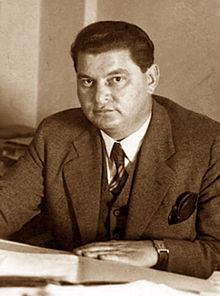Daniel Auster
Daniel Auster | |
|---|---|
 | |
| Mayor of Jerusalem | |
| In office 1937–1938 | |
| Preceded by | Husayn al-Khalidi |
| Succeeded by | Mustafa al-Khalidi |
| In office 1944–1948 | |
| Preceded by | Mustafa al-Khalidi |
| Succeeded by | Teddy Kollek (1967) |
| Mayor of West Jerusalem | |
| In office 1948–1950 | |
| Succeeded by | Shlomo Zalman Shragai |
| Personal details | |
| Born | 7 May 1893 Knihinin, Galicia, Austria-Hungary |
| Died | 15 January 1963 (aged 69) Israel |
| Political party | General Zionists |
| Spouse | Julia Auster |
Daniel Auster OBE (Hebrew: דניאל אוסטר, 7 May 1893 – 15 January 1963) was Mayor of Jerusalem in the final years of Mandatory Palestine, the first Jewish mayor of the city, and the first mayor of Jerusalem after Israeli independence.[1]
Biography
Daniel Auster was born in Kniahynyn, a Galician town that is now a district of the city Ivano-Frankivsk, Ukraine.[2] He immigrated to Ottoman-controlled Palestine prior to World War I after finishing his law studies at the university in Vienna, Austria, from which he graduated in 1914. He initially settled in Haifa and taught German at the Reali School.[3]
He first served at the Austrian expeditionary force headquarters in Damascus, assisting Arthur Ruppin in sending financial help from Constantinople to the starving Yishuv. In 1919, he became Secretary of the Legal Department of the Zionist Commission in Jerusalem. He became Deputy Mayor of Jerusalem under Husayn al-Khalidi in 1936.
In 1937, he became the first Jewish mayor of Jerusalem. He was also a member of the Assembly of Representatives for the General Zionists party and a signatory of the Israeli Declaration of Independence.[4]
In November 1947, he was a member of the Jewish Agency's delegation to the Working Committee of the Trusteeship Council which attempted to draw up a Draft Statute for Jerusalem, but in 1949, he openly declared his opposition to the internationalization of Jerusalem and stated categorically that it was not possible.[5] He contested the 1949 Knesset elections as the leader of the "For Jerusalem" list,[6] but it failed to win a seat.
Awards
For his service, Auster was made an Officer of the Order of the British Empire by King George VI.[7][3][8]
References
- ^ "Summary record of a meeting between the committee on Jerusalem and Mr. Daniel Auster, Mayor of Jerusalem (Jewish sector)". Archived from the original on December 24, 2013.
- ^ "and the Independence Declaration of the State of Israel". Archived from the original on 2014-12-05. Retrieved 2014-11-30.
- ^ a b "It's Sad to Be the Mayor of Jerusalem". Haaretz.
- ^ The Signatories of the Declaration of the Establishment of the State of Israel
- ^ UNITED NATIONS CONCILIATION COMMISSION FOR PALESTINE COMMITTEE ON JERUSALEM Archived 2013-12-24 at the Wayback Machine
- ^ For Jerusalem Israel Democracy Institute
- ^ Ben-Sorek, Esor. "The Proposed 'Ben-Sorek' Plan". Retrieved 17 September 2023.
- ^ Stein, Rose (1946). "Appointments, Honors and Elections". The American Jewish Year Book. 48: 471–480. JSTOR 23602832. Retrieved 17 September 2023.
